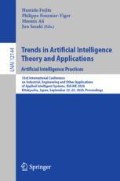Abstract
Model-based diagnosis has been an active area of AI for several decades leading to many applications ranging from automotive to space. The underlying idea is to utilize a model of a system to localize faults in the system directly. Model-based diagnosis usually is implemented using theorem provers or constraint solvers combined with specialized diagnosis algorithms. In this paper, we contribute to research in model-based diagnosis and present a way of using answer set programming for computing diagnoses. In particular, we discuss a specific coding of diagnosis problems as answer set programs, and answer the research question whether answer set programming can be used for diagnosis in practice. For this purpose, we come up with an experimental study based on Boolean circuits comparing diagnosis using answer set programming with diagnosis based on a specialized diagnosis algorithm. Although, the specialized algorithm provide diagnoses in shorter time on average, answer set programming offers additional features making it very much attractive to be used in practice.
Access this chapter
Tax calculation will be finalised at checkout
Purchases are for personal use only
Notes
References
Abreu, R., Hofer, B., Perez, A., Wotawa, F.: Using constraints to diagnose faulty spreadsheets. Softw. Qual. J., 1–26 (2014). https://doi.org/10.1007/s11219-014-9236-4
Beschta, A., Dressler, O., Freitag, H., Montag, M., Struss, P.: A model-based approach to fault localization in power transmission networks. Intell. Syst. Eng. (1992)
Buchanan, B.G., Shortliffe, E.H. (eds.): Rule-Based Expert Systems - The MYCIN Experiments of the Stanford Heuristic Programming Project. Addison-Wesley Publishing Company (1984)
Chen, Y., Wan, H., Zhang, Y., Zhou, Y.: dl2asp: implementing default logic via answer set programming. In: Janhunen, T., Niemelä, I. (eds.) JELIA 2010. LNCS (LNAI), vol. 6341, pp. 104–116. Springer, Heidelberg (2010). https://doi.org/10.1007/978-3-642-15675-5_11
Clocksin, W.F., Mellish, C.S.: Programming in Prolog, 5th edn. Springer, Heidelberg (2003). https://doi.org/10.1007/978-3-642-55481-0
Davis, R.: Diagnostic reasoning based on structure and behavior. Artif. Intell. 24, 347–410 (1984)
Eiter, T., Ianni, G., Krennwallner, T.: Answer set programming: a primer. In: Tessaris, S., et al. (eds.) Reasoning Web 2009. LNCS, vol. 5689, pp. 40–110. Springer, Heidelberg (2009). https://doi.org/10.1007/978-3-642-03754-2_2
Felfernig, A., Schubert, M., Zehentner, C.: An efficient diagnosis algorithm for inconsistent constraint sets. AI EDAM 26(1), 53–62 (2012). https://doi.org/10.1017/S0890060411000011
Friedrich, G., Stumptner, M., Wotawa, F.: Model-based diagnosis of hardware designs. Artif. Intell. 111(2), 3–39 (1999)
Jannach, D., Schmitz, T.: Model-based diagnosis of spreadsheet programs: a constraint-based debugging approach. Autom. Softw. Eng., 1–40 (2014). https://doi.org/10.1007/s10515-014-0141-7
de Kleer, J., Williams, B.C.: Diagnosing multiple faults. Artif. Intell. 32(1), 97–130 (1987)
Luna, J.M., Fournier-Viger, P., Ventura, S.: Frequent itemset mining: a 25 years review. Wiley Interdiscip. Rev. Data Mining Knowl. Discov. 9(6) (2019). https://doi.org/10.1002/widm.1329
Mathonet, R., Cotthem, H.V., Vanryckeghem, L.: DANTES – an expert system for real-time network troubleshooting. In: Proceedings IJCAI, pp. 527–530. Morgan Kaufmann, Milano, August 1987
Milde, H., Guckenbiehl, T., Malik, A., Neumann, B., Struss, P.: Integrating model-based diagnosis techniques into current work processes - three case studies from the INDIA project. AI Commun. 13 (2000). Special Issue on Industrial Applications of Model-Based Reasoning
Nica, I., Pill, I., Quaritsch, T., Wotawa, F.: The route to success - a performance comparison of diagnosis algorithms. In: IJCAI, pp. 1039–1045. IJCAI/AAAI (2013)
Pell, B., et al.: A remote-agent prototype for spacecraft autonomy. In: Proceedings of the SPIE Conference on Optical Science, Engineering, and Instrumentation, Volume on Space Sciencecraft Control and Tracking in the New Millennium. Bellingham, Waschington, U.S.A., Society of Professional Image Engineers (1996)
Picardi, C., et al.: IDD: integrating diagnosis in the design of automotive systems. In: Proceedings of the European Conference on Artificial Intelligence (ECAI), pp. 628–632. IOS Press, Lyon (2002)
Rajan, K., et al.: Remote agent: an autonomous control system for the new millennium. In: Proceedings of the 14th European Conference on Artificial Intelligence (ECAI), Berlin, August 2000
Reiter, R.: A logic for default reasoning. Artif. Intell. 13(1–2) (1980)
Reiter, R.: A theory of diagnosis from first principles. Artif. Intell. 32(1), 57–95 (1987)
Sachenbacher, M., Struss, P., Carlén, C.M.: A prototype for model-based on-board diagnosis of automotive systems. AI Commun. 13 (2000). Special Issue on Industrial Applications of Model-Based Reasoning
Wotawa, F., Stumptner, M., Mayer, W.: Model-based debugging or how to diagnose programs automatically. In: Hendtlass, T., Ali, M. (eds.) IEA/AIE 2002. LNCS (LNAI), vol. 2358, pp. 746–757. Springer, Heidelberg (2002). https://doi.org/10.1007/3-540-48035-8_72
Wotawa, F.: Reasoning from first principles for self-adaptive and autonomous systems. In: Lughofer, E., Sayed-Mouchaweh, M. (eds.) Predictive Maintenance in Dynamic Systems, pp. 427–460. Springer, Cham (2019). https://doi.org/10.1007/978-3-030-05645-2_15
Acknowledgement
The research was supported by ECSEL JU under the project H2020 826060 AI4DI - Artificial Intelligence for Digitising Industry. AI4DI is funded by the Austrian Federal Ministry of Transport, Innovation and Technology (BMVIT) under the program “ICT of the Future” between May 2019 and April 2022. More information can be retrieved from https://iktderzukunft.at/en/
 .
.
Author information
Authors and Affiliations
Corresponding author
Editor information
Editors and Affiliations
Rights and permissions
Copyright information
© 2020 Springer Nature Switzerland AG
About this paper
Cite this paper
Wotawa, F. (2020). On the Use of Answer Set Programming for Model-Based Diagnosis. In: Fujita, H., Fournier-Viger, P., Ali, M., Sasaki, J. (eds) Trends in Artificial Intelligence Theory and Applications. Artificial Intelligence Practices. IEA/AIE 2020. Lecture Notes in Computer Science(), vol 12144. Springer, Cham. https://doi.org/10.1007/978-3-030-55789-8_45
Download citation
DOI: https://doi.org/10.1007/978-3-030-55789-8_45
Published:
Publisher Name: Springer, Cham
Print ISBN: 978-3-030-55788-1
Online ISBN: 978-3-030-55789-8
eBook Packages: Computer ScienceComputer Science (R0)

